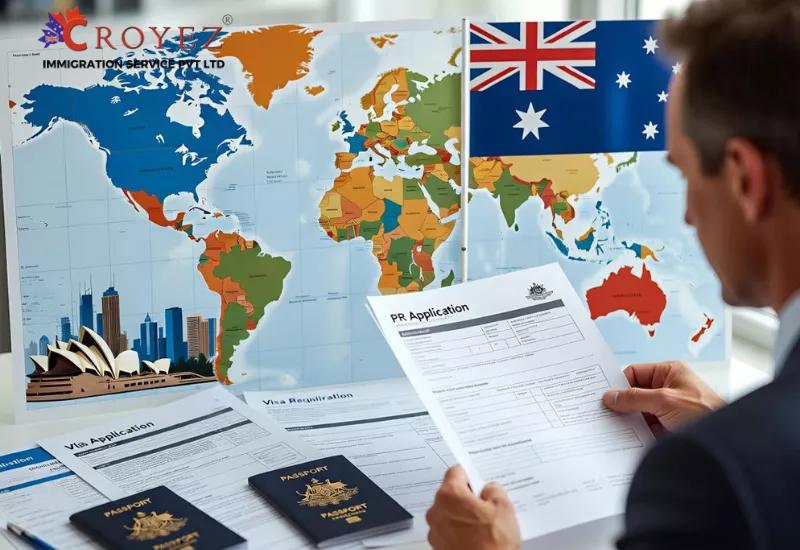Canada is one of the popular destinations for students from India wanting to take up higher education abroad. It is known for its world-class universities, friendly environment and high quality of life. Canada offers a diverse cultural experience along with academic excellence. University of Toronto, McGill University and the University of British Columbia and provide various programs for students at all levels from undergraduate to doctoral studies.
Indian students should understand the requirements for studying in Canada. This includes the application process, language proficiency and academic qualifications. One of the most important steps in securing a Canadian student visa which requires proof of admission, financial stability and educational credentials. For both career development and education Canada is a popular destination. This is because the Canadian government provides possibilities for PR for graduates.
For a smooth transition the applicant should make prior planning to understand the visa processes, financial documentation and cultural differences. By being aware of the requirements and preparing accordingly, Indian students can set themselves up for success in Canada both academically and professionally. This blog will guide you through the most important steps including the application process to getting settled in Canada.
Academic Requirements
To study in Canada specific academic qualifications should be met by Indian students. This depends on the level of degree they wish to study.
For Undergraduate Studies:
Students from India should have completed their higher secondary education which is Class 12 from a recognized board in India. Usually a qualification which is equivalent to the Canadian high school diploma is required. Some universities may demand subject-specific requirements specific grade point average GPA depending on the course.
For Postgraduate Studies:
The Indian students opting to pursue their postgraduate studies in Canada should have completed a bachelor’s degree or its equivalent. Indian students must submit their marksheets. In some cases, a Statement of Purpose or Letters of Recommendation may be needed.
Transcripts and Certification:
It is mandatory for the students to provide their marksheets while applying for Canadian programs. In addition to this they may be asked to provide an attested copy of their certificates or proof of the equivalency of their Indian qualifications. The universities in Canada typically assess academic credentials through a recognized evaluation service such as WES World Education Services.
Language Proficiency
One of the key Canadian requirements for student visa from India is proficiency in English or French, depending on the university and region. The most common requirement is English proficiency as most Canadian universities offer courses in English
Some of the officially accepted tests are listed below:
IELTS:
The International English Language Testing System commonly known as IELTS is widely accepted by Canadian universities. A minimum overall score of 6.0 to 6.5 is the usual requirement but for each institution and program it differs.
TOEFL:
The Test of English as a Foreign Language known as TOEFL is another popular test accepted by Canadian universities. The minimum requirement score generally ranges between 80-100.
French Proficiency:
If you plan to study in Quebec or any French-speaking region proficiency in French is required. The TEF abbreviated as Test d Evaluation de Francais is the most commonly accepted French language test.
Admission Process
In the first step of the application process, Indian students have to select the course and the institution in which they want to study. It is important to choose an institution from a wide array of options available. The chosen course should be the one that aligns with your academic and career goals. Making proper research on the program details, faculty, alumni success and placement statistics makes your decision the best one.
Application Timelines:
The deadlines for application usually vary depending on the course and institution chosen. Indian students should begin their application process at least 8-12 months before their intended month of intake into the program.
Required Documentation:
Academic mark sheets and language proficiency scores are the mandatory documents. Apart from these, the applicants should provide basic documents such as a passport, resume, LOR and the Statement of Purpose.
Personal Statement:
An important part of the application will be the personal statement. It allows you to present your motivation for studying abroad, your academic and professional ambitions and why you believe you are a suitable candidate for the program.
Financial Proof
To be granted a study visa for Canada, Indian students must demonstrate that they have sufficient financial resources to cover tuition fees, living expenses and other costs during their stay.
The acceptable documents for Proof of Funds include:
- Bank statements showing sufficient balance for at least the past 6 months
- GIC known as Guaranteed Investment Certificate for faster visa processing
- Funding from sponsors and Scholarship award letters
Canada PR Rules for Indian Students:
Indian students studying in Canada are eligible to apply for PR after their graducaton.
The Canadian government offers pathways to PR through the Express Entry Program, where students with Canadian educational credentials can earn extra points.
Student Visa
A Canadian study permit is required for Indian students wishing to study in Canada for more than six months.
Required Documents:
- Valid passport
- Letter of Acceptance from a Designated Learning Institution
- Proof of funds to cover tuition and living expenses
- Medical examination
- clearance certificate from Police officials
Student Direct Stream:
The SDS makes visa processing to be faster for students from India who meet specific criteria. This includes achieving certain language proficiency scores providing proof of funds through a GIC and get a letter of acceptance from a DLI.
Health and Medical Requirements
Health and medical requirements are a major part of the visa application process. The students have to undergo a medical examination. The students should also get health care insurance which covers their medical expenses while studying in Canada. This is because health care is too expensive for students.
Work Authorization
Students from India pursuing their higher education in Canada are permitted to work for 20 hours per week. They can also work during full-time scheduled breaks such as the winter and summer breaks. This allows them to earn a small amount for themselves. Students will be eligible for a Post-Graduation Work Permit once at least 8 months of their course duration is completed. This PGWP allows them to work in Canada for 3 years or even more depending on the course duration of the student. Students gain experience through this and it will be helpful for them to apply for PR through the Express Entry program.
Accommodation
On-campus housing and off-campus housing are the two options available for Indian students. Most universities have residential accommodations and dorms. Students who prefer these halls or hostels can choose them. But these are often expensive and limited.
Off-campus housing is that the students should stay outside the universities. Students have to rent flats and communal campuses. This can be found on local posters and on university notice boards. Some basic tips to follow while making accommodation arrangements are to rent houses or flats that are near to the college, reasonably priced and are accessible to public transport.
Cultural Adaptation and Support Services
Canada is known for its multicultural society, and international students are welcomed with open arms. Understanding Canadian cultural norms and academic expectations is essential for a smooth transition.
Student Support Services: Most Canadian universities provide resources such as international student offices, counseling services and cultural clubs to help students adapt to their new environment and find community support.
Financial Aid and Scholarships
Many Canadian institutions provides the international students with scholarships. They are eligible for a variety of funding options. The types of Scholarships include University-specific scholarships, Private and non-profit organization scholarships, Government-funded scholarships. Making a proper research and applying for scholarships can significantly reduce the financial burden of studying abroad.
Conclusion
Studying in Canada provides Indian students with numerous benefits. Some of the benefits include world-class education opportunities for work and permanent residency. Students have to thoroughly understand the Canada student visa requirements, academic expectations and financial obligations. With this students can have a smooth and successful application process.
If you need expert assistance in getting through the complex requirements for studying in Canada contact an immigration consultant like Croyez Immigration. This can provide personalized support to help you achieve your academic dreams. Plan well, meet all the requirements and begin on a fulfilling educational journey in Canada.





